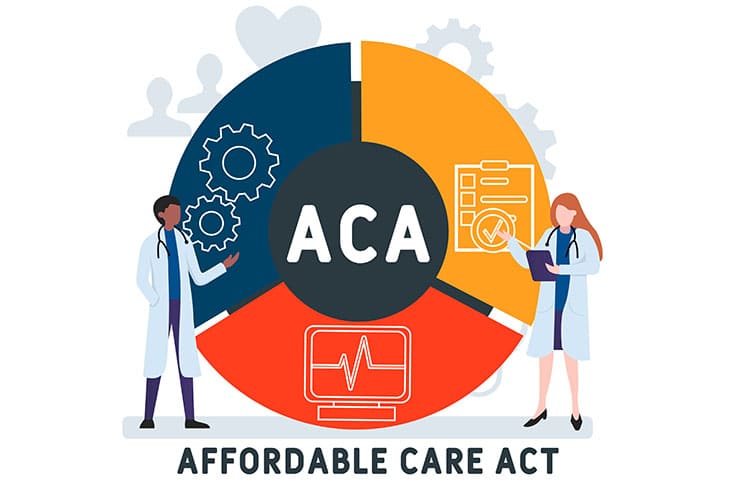June 12, 2023
By Jennifer Snow

Each year, elected Representatives in the House and the Senate introduce thousands of bills in the U.S. Congress. A small percentage of those bills are passed and signed into law by the President. Some of those laws have a very local impact — like laws that rename a neighborhood post office in honor of a local hero. Fewer of those laws have a national impact — like laws that modify how you file your taxes each year. Even fewer become landmark laws that revolutionize an industry and have an everyday impact on millions of Americans. The Affordable Care Act (known as ACA or “Obamacare”) is one of those once-in-a-lifetime laws.
In 2010, the ACA was signed into law as the most significant expansion of health care coverage since the enactment of Medicare and Medicaid in 1965. The law had wide-reaching implications for the entire U.S. health care industry, and profound implications for mental health. Most importantly, ACA had a direct impact on NAMI members across the country.
Here are the key ways the ACA improved health insurance coverage for people with mental health conditions.
Mental illness is poised to become the most common pre-existing condition nationwide.
Before the ACA, some health insurers routinely denied coverage to people with mental health and substance use disorders.
People, like Timothy, a programmer who explains, “the first job I worked … had an insurance company that reserved the right to refuse health insurance to anyone with health problems. So, they refused health insurance to me because of my psychiatric disorder.” Thanks to the ACA, people with mental illness cannot be refused coverage.
Before the ACA, some health insurers could choose not to cover mental health and substance use disorder services or apply annual or lifetime limits on these services. ACA requires coverage of mental health and substance use disorder services in most health insurance, without annual or lifetime limits on these services. ACA also extended the protections of the Mental Health Parity and Addiction Equity Act (MHPAEA) to individual and small group plans so people can’t be charged higher cost-sharing for mental health services than they do for other medical services.
“Because of the Affordable Care Act, [my son] has been able to see a psychiatrist,” says Lilian, whose son was diagnosed with schizophrenia at age 21. “Without the Affordable Care Act, none of this would be possible.”
Before the ACA, people seeking private health insurance were often priced out of coverage. As the result of Medicaid expansion, tax credits to purchase private health insurance and limits on deductibles and copays, the number of people who don’t get mental health treatment because of the cost has gone down by one-third.
“Even though I’m highly educated, I do have a history of psychosis,” mental health advocate Joy says. For the past few years, she has only been able to work temp jobs that provided little to no health care. “Without the Affordable Care Act, then health insurance just wouldn’t have been available to me.”
Before the ACA, young adults were frequently uninsured because their parent’s plans no longer covered them, and they could not afford separate coverage. With the ACA, young adults can remain on their parent’s plan up to the age of 26, even if they no longer live at home. This is a crucial extension, since 75% of all cases of lifetime mental illness begins by age 24.
When young adult Maggie experienced a mental health crisis, she was job searching and didn’t have employer health coverage. “Because of ACA, I’m alive,” she says because she was covered on her parents’ health insurance plan and could get the intensive and lifesaving care she needed.
There have been many additional benefits of the ACA. Specifically, thanks to the ACA:
Even though the ACA has been law for more than a decade, there have been more than 2,000 legal challenges filed in state and federal courts contesting part or all of the ACA. The most recent challenge involves the ACA requirement that most private insurance plans cover recommended preventive care services without cost sharing. NAMI will continue to fight against these challenges because we cannot go back.
Here are some ways you can join the NAMI community in this vision:
We cannot go back to a time when health insurance was unavailable, inaccessible and discriminatory for people with mental health conditions. Instead, we must look forward and work to build on the successes of the ACA. We will not stop until all people with mental health conditions have accessible, affordable and comprehensive health care.
Jen Snow is the National Director of Government Relations and Policy at NAMI.
We’re always accepting submissions to the NAMI Blog! We feature the latest research, stories of recovery, ways to end stigma and strategies for living well with mental illness. Most importantly: We feature your voices.
LEARN MORENAMI HelpLine is available M-F, 10 a.m. – 10 p.m. ET. Call 800-950-6264,
text “NAMI” to 62640, or email. In a crisis, call or text 988 (24/7).